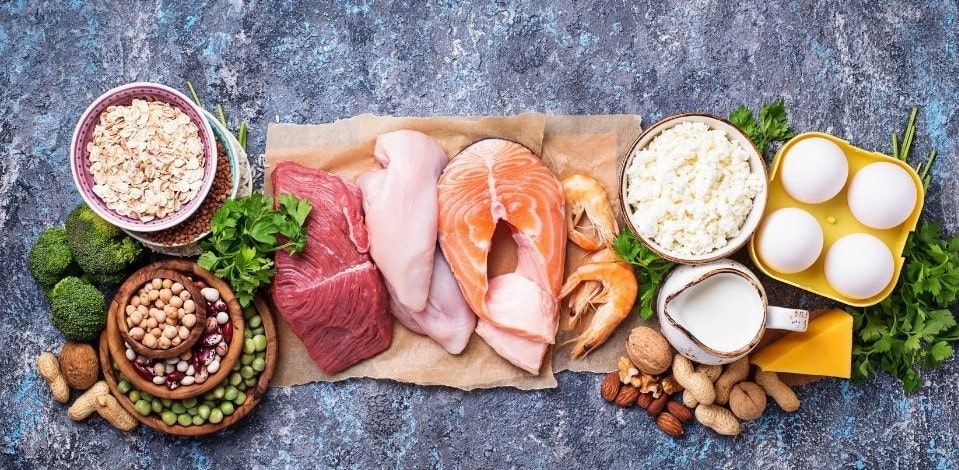As a runner you know that nutrition plays a huge role in fueling and recovery, but often carbohydrates are the first thought. Yes carbs are important, but what about protein, how does protein fit into a runner’s daily nutrition plan?
Protein is the building block of muscles, and is essential for growth and repair. There are so many options out there for protein. So what protein should you eat? Should you stick to the basic meat options or opt for a plant based option? What about protein powders?
This post is going to break down why protein is important for runners, how much is needed and when, and provide insight on the best types of protein.
Are you ready to learn more about the best protein for runners? Let’s dive in!

What is protein & why is it important for runners?
Protein is an essential macronutrient required for sustaining human life, as it provides structure to all cells in your body! Your hair, skin, and muscles are all primarily made up of protein.
For runners, protein helps with repair and growth and is essential for recovery.
How much protein do runners need?
The amount of protein needed for the average non-active person is 0.8-1.2 g of protein per kg of body weight. For endurance athletes, such as runners, the recommendations for protein intake increase to 1.2-2 g of protein per kg of body weight each day (1).
So to put this in perspective, a 150 pound runner (68.2 kg), would need to consume about 82-136 grams of protein a day.
Every athlete is going to be different, which means that something that works for another runner may not work for you. If you are consuming protein within the recommended range, and you feel as though you are able to adequately recover, you are probably consuming enough protein.
Of note, this is general information, for specific advice and recommendations for your individual needs consult with a registered dietitian.
When should a runner eat protein?
The timing of when a runner is eating protein may arguably be just as important as how much protein they are eating. Ideally, a runner will have some protein with each of their meals (breakfast, lunch, and dinner) and snacks. The only exception to this would be the pre-workout/training or pre-race snack, which should be largely carbohydrate based.
The most important tip for runners is to consume a post-workout/training or post-race snack high in protein within 30 minutes of activity. This will help jumpstart the refueling process for your muscles aka begin the repair and recovery process.
What types of protein should a runner eat?
A runner should look to consume mostly complete proteins. What does this mean? Well, it means that the protein has all nine essential amino acids packed in. These essential amino acids are unable to be made by your body, so we count on getting them from outside sources.
All animal protein sources are going to be complete. Some examples of animal protein foods include:
- Chicken
- Fish
- Beef
- Pork
- Eggs
- Dairy
When it comes to choosing animal sources, be sure to mostly consume lean sources such as chicken and fish. Beef and pork can be okay for the occasional protein intake, but should not be the main sources.
What about plant based protein for runners?
Plant based diets and lifestyles are all the rage recently, and for good reason! There are endless benefits to eating more fruits and veggies, but what about protein? Can a runner get adequate protein while following a plant based diet?
The short answer is yes, but it may not be easy, especially at first. Many plant based proteins are incomplete proteins, which means they do not have all 9 essential amino acids.
Some examples of plant based protein foods include:
- Soy
- Nuts and Seeds
- Legumes
- Whole grains
If you are able to mix and match some of these plant based proteins, there should be no issue with adequate intake. As always, if you are a plant based runner and are concerned about your protein reach out to work with a registered dietitian!
Are protein powders needed?
Protein powders can be an awesome supplement to protein intake, but should be thought of as just that, a supplement. Whole food first is always the best way to think.
There are some instances where protein powders may be optimal, such as a runner who is unable to stomach solid foods after a workout. In these instances you could instead consume something such as a smoothie with added protein powder.
There can be a place for protein powder in a runner’s diet, it just should not be thought of as the only protein intake.
Final thoughts
Protein often gets the short end of the stick when it comes to discussing runner nutrition as carbohydrates often take center stage. But as you can tell after reading this post, protein has a very important role.
Protein is essential for muscle building and recovery.
Protein intake is going to vary per athlete, but protein needs should be somewhere within the range of 1.2-2 g of protein per kg of body weight
A runner should eat protein with each meal, but it is especially important to eat protein within 30 minutes after activity.
There is a place in your diet for all types of protein, whether it be plant based, animal based, or protein powder. It is important to pay attention to intake of complete and incomplete proteins, and focus on a “whole food sources first” mentality.
If you enjoyed this post or learned something new please leave a comment below! Thank you and happy running!
